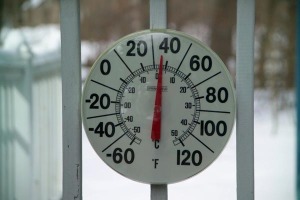A Russian think tank alleges that climate-change data obtained from that country have been cherry-picked to overstate a rise in temperatures. With Russia accounting for a large portion of the world’s land mass, incorrect data there could affect the analysis of global temperatures.
The Institute of Economic Analysis, an independent Moscow-based organization, issued the report Tuesday. It was titled, “How Warming Is Being Made: The Case of Russia.”
It alleged that England’s Hadley Centre for Climate Change and the Climate Research Unit at the University of East Anglia, the U.K.’s two top climate research outfits, had improperly selected climate data from Russia.
The Hadley Centre has issued a statement saying it was impossible for them to have tampered with the data. The same statement conceded possible flaws, but these were due to “the limited availability of Northern Hemisphere high latitude observations.” It further claimed that its data may actually have underestimated the warming trend in Russia.
Climate Fallout
The Russian study is part of the “climategate” fallout regarding the e-mails and other data leaked from the CRU last month. Some of the information appeared to show top climate scientists expressing private doubts about their data and in other cases tweaking them to bolster warming claims.
The leaked data reignited debate over global warming science. Sen. James Inhofe, R-Okla., ranking Republican on the Senate Environment and Public Works Committee, has demanded a hearing into the leaked data.
Environmental Protection Agency Administrator Lisa Jackson, during a press conference to announce that the agency now had the authority to regulate greenhouse gases on its own, disputed that the leaks showed any need to reexamine the underlying science.
In the wake of the controversy the CRU and Hadley Centre placed some of their previously private climate data in the public domain. The IEA study examines the data as they pertain to warming in Russia.
The entire study has not been officially translated into English but institute president Andrei Illario-nov discussed the findings with IBD. He also wrote a summary of them for the free market Cato Institute, where he is a senior fellow.
According to Illarionov, an analysis of the climate data shows that the data in Russia came from just 25% of the country’s meteorological stations and missed about 40% of the country’s land mass.
The chosen stations tended to be the ones closer to large population centers, which tend to be warmer.
“(The report) is an analysis of what stations have been used, what stations have not been used and, based on this analysis, it looks like the real actual temperature dynamics … in Russia, that is the increase in warming, have been artificially increased by 0.64 degrees Celsius,” Illarionov told IBD.
Russia accounts for 12.5% of the world’s total land mass, he notes, and argues that this calls for a reevaluation of United Nations’ Intergovernmental Panel of Climate Change’s finding that the global temperature rose 0.76 degrees Celsius over the last century.
“The IEA report concludes that it is necessary to recalculate all global temperature data in order to assess the real rate of temperature change during the last century. Global temperature data will have to be modified because the calculations used by Copenhagen Conference on Climate Change analysts are based on (Hadley-CRU) research,” Illarionov wrote in his Cato posting.


I never thought I’d say it but, go Russian dude!
Reaching out to a former “communist” must be quite a strain for you. Alas insanity has no international borders.
Let’s get working on the defeat of Cap N Trade!